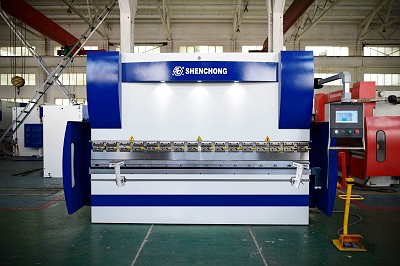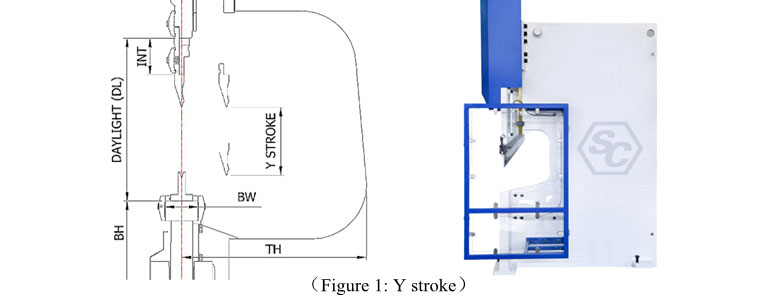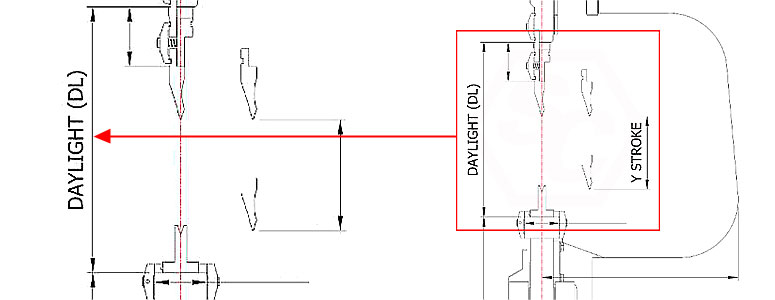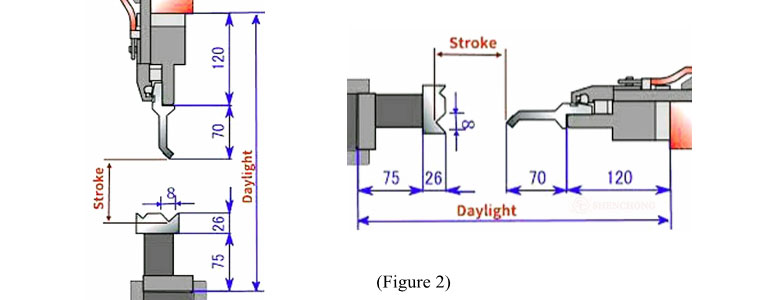
A press brake machine is a piece of equipment used to process metal sheets. It can bend the metal sheet according to the set angle and arc through the up and down moving workbench and the up and down moving upper mold. The press brake stroke refers to the distance the worktable moves up and down. It determines the maximum thickness and bending angle of the metal sheet that the bending machine can process.
The press brake stroke is an important parameter that affects the processing capacity and efficiency of the bending machine. The selection of the bending stroke needs to be determined based on the actual processing needs, taking into account factors such as processing efficiency and processing cost.

The stroke is the distance from the top dead center to the bottom dead center of the press brake.
The top dead center is the position when the slider reaches the top end.
The bottom dead center is the position when the slider reaches the bottom end.
It can be understood that the stroke of the press brake from fully opened to fully closed is the press brake stroke.
The stroke of the press brake is also the distance from the tip of the upper punch from the top of the equipment to the closing of the tip of the upper punch and the lower die.
You can refer to the figure 1 below, the “Y stroke” in the figure below is the stroke of the bending machine.

The stroke size of the bending machine has a great impact on processing. It determines the maximum thickness and bending angle of the metal sheet that the press brake can process.
If the stroke is too small, it will not be able to process metal sheets that are too thick or bend at too large angles, limiting the application range of the bending machine. If the stroke is too large, it will waste more time and energy when processing small parts, which is uneconomical.
We can know from Figure 1. The stroke of the press brake is also closely related to the toolings and daylight. In the course of daily operation. Customers will choose different toolings according to their workpieces. When the height of the toolings is different, the stroke will also change.
Customers buying a press brake often need to do a variety of workpieces. A set of tooling is usually not suitable for all workpieces. Customers need to select and purchase other toolings. When the customer chooses the toolings, we have to consider the stroke and daylight.
These two parameters are very important and affect how we choose and buy press brake toolings. However, in actual situations, the stroke and daylight are often overlooked. If these two parameters are not considered. When customers choose the height of the tooling, they often make mistakes.
It may cause the workpiece to be unable to be folded. In addition, the daylight and oil cylinder stroke of the bending machine are determined when the machine is manufactured. Customers can choose the appropriate daylight and stroke according to their needs. This can avoid wasting money.
We have explained above that the stroke from fully opened to fully closed is the stroke. Here we also briefly explain the daylight.
The daylight is the distance from the bottom of the upper beam to the top of the lower beam when the press brake is in the fully opened position. Refer to “Daylight” in Figure 1.

When choosing a mold for a bending machine, we have a few things to pay attention to:
- When selecting a mold, the distance between the tip of the punch of the upper die and the top of the mold needs to be considered.
- It should be noted that any die holders or die adaptors in your machine will consume some of the available opening height.
- When making some boxes and other workpieces, the upper die of the bending machine needs to be made higher, so that the corresponding opening height should also be higher.
Now we know the stroke of the press brake is also closely related to the toolings and daylight. In the course of daily operation. Customers will choose different toolings according to their workpieces. When the height of the toolings is different, the stroke of the press brake will also change.
Some workers do not understand the relationship between the stroke and the toolings and the daylight, which can only be determined by experiments. Below we will introduce how to determine the stroke through calculation?
Here, I will give you a specific example to demonstrate how to calculate the stroke of the press brake.
We have said before,the stroke is also the distance from the tip of the upper punch from the top of the equipment to the closing of the tip of the upper punch and the lower die.
Stroke = Daylight -The total height of bottom die (height of bottom die and die holder or adaptor) – The height of top punch – The height of clamping + Depth of die notch – Plate thickness

From Figure 2, we can see the following data
The total height of bottom die: 75+26=101mm
The height of top punch: 70mm
The height of clamping: 120mm
Depth of die notch: 8/2=4mm
We assume that daylight is 400mm, plate thickness is 1mm, then the machine stroke is calculated as follows,
400-101-70-120+4-1=112mm
The stroke is 112mm
The use must pay attention to the adjustment stroke, and the machine must be tested before bending.
When the press brake upper die descends to the bottom, there must be a gap of plate thickness. Otherwise it will cause damage to the mold and the machine.
The press brake stroke adjustment also has electric quick adjustment and manual fine adjustment.
First check whether the ratio of the thickness of the sheet metal bending machine mold to the upper and lower modules is normal.
Generally, the slider needs to be controlled at the switching point of the stroke line. This must be noted, otherwise the mold cannot be used normally, but some people still often make such mistakes.
The selection of the bending machine stroke should be determined based on the actual processing needs. First, you need to determine the maximum thickness and maximum bending angle of the metal sheet to be processed, and then select the appropriate bending machine stroke based on these parameters. At the same time, processing efficiency and processing cost must also be considered.